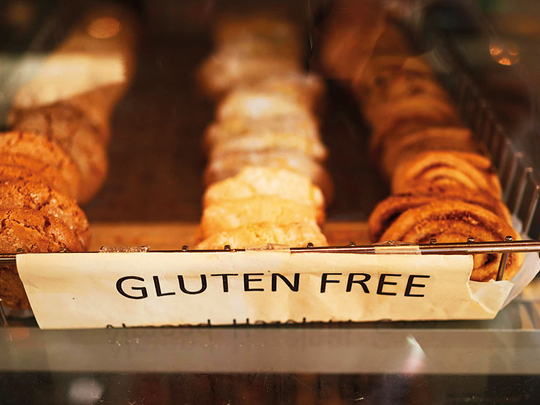
Young adults are choosing “gluten-free” products because they think they are healthy, but new research shows some of those who buy them also have unhealthy behaviours, such as smoking or vomiting to try to lose weight.
Gluten-free products are soaring in popularity around the world. Global sales rose by 12.6 per cent to hit $3.5 billion (Dh12.8 billion), between 2016 and 2017 compared with 4 per cent for packaged foods generally, according to Euromonitor.
Gluten-free diets are medically advised for people suffering from the digestive condition coeliac disease , but most of the growth in sales is among people who do not need to eat gluten-free foods.
According to the study, a Gallup poll in 2015 in the US reported that one in five consumers said they actively try to include gluten-free foods in their diet. Some celebrities have endorsed them for weight-loss.
The new research in the Journal of the Academy of Nutrition and Dietetics among young adults aged 25 to 36 in Minnesota in the US found that many choose gluten-free because of its “health halo” - the perception that it is better for you. Other labels that have a similar health halo include “low sodium”, “natural” or “free from” artificial additives.
Of 1,819 of these young adults who are enrolled in a long-term study called Project Eat, 13 per cent said they valued gluten-free foods. They tended to be people who also valued organic, locally-grown, non-GMO, and not processed foods, the survey found, and had a weight goal - usually to lose weight although a few (usually young men) hoped to gain weight.
But while many ate in a very healthy way, having breakfast and eating lots of fruit and vegetables, others were potentially doing themselves harm by smoking, taking diet pills and making themselves vomit. Those who engaged in such unhealthy behaviours were three times more likely to value gluten-free foods than those who ate well, the survey found.
“I have concerns about the increasing number of people who perceive that eating a gluten-free diet is a healthier way to eat. Of particular concern is the higher risk for those engaging in unhealthy weight control practices for perceiving a gluten-free diet as important, given that eating gluten-free may be viewed as a ‘socially acceptable way’ to restrict intake that may not be beneficial for overall health,” said lead investigator Prof Dianne Neumark-Sztainer, head of the division of epidemiology and community health at the University of Minnesota.
“If there is a need for eating gluten-free, then it is important to avoid foods with gluten. Otherwise, a dietary pattern that includes a variety of foods, with a large emphasis on fruits, vegetables, and whole grains, is recommended for optimal health.”
The researchers also worry that people who go for gluten-free and other so-called healthier foods may over-eat, assuming that you can’t have too much of a good thing. “Products labeled as ‘low sodium,’ ‘natural,’ and ‘free from’ certain food components or characteristics may be interpreted by consumers as being healthier overall,” said lead author Mary J. Christoph of the university’s department of paediatrics.
“The health halo effect can have unintended consequences on eating habits, such as people over-consuming because they believe they have chosen a healthier product.”
The paper points out that gluten-free foods are also expensive and says there is no reason to recommend them. “Young adults should be advised that eating gluten-free products may not improve weight or health,” it says.
Gluten is a protein found in grains such as wheat, barley and rye. Plenty of healthy foods, such as fruit and vegetables, contain no gluten. The concern is over gluten-free substitute packaged foods, which can be high in calories, saturated fats and salt.
A big US study published last year found that avoiding whole grains in order not to eat gluten could lead to an increased risk of heart disease. “The promotion of gluten-free diets among people without coeliac disease should not be encouraged,” concluded the study in the British Medical Journal .











